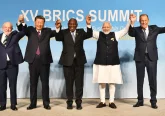 Reem Abou-El-Fadl has recently published an article in Al-Akhbar English newspaper entitled ‘From Nasser to Tantawi: The Myth of “Sixty Years of Oppression”‘. The article considers the connections that have been made in Egypt between the July 1952 Revolution, launched by the Free Officers movement, and the January 2011 Revolution, launched by this year’s popular uprising in Egypt. The article acknowledges that military officials first came into government after the July Revolution, but it goes on to explore the deceptive myth of ‘sixty years of oppression’ since, which has been heard often in recent months.
Reem Abou-El-Fadl has recently published an article in Al-Akhbar English newspaper entitled ‘From Nasser to Tantawi: The Myth of “Sixty Years of Oppression”‘. The article considers the connections that have been made in Egypt between the July 1952 Revolution, launched by the Free Officers movement, and the January 2011 Revolution, launched by this year’s popular uprising in Egypt. The article acknowledges that military officials first came into government after the July Revolution, but it goes on to explore the deceptive myth of ‘sixty years of oppression’ since, which has been heard often in recent months.
‘Yet today’s generals are protecting an entirely different set of interests from those important to the Free Officers. They have presided over months of delay in the trials of Mubarak and his aides, and have stalled and bargained with the revolutionary forces over every aspect of constitutional and electoral reform. They have thrown over 8,000 people in military prisons, and have even turned their tanks and guns on peaceful demonstrators at Maspero. The generals’ statements in support of the January Revolution can no longer conceal their connections with the old regime and their return to the worst of its tactics.
‘Certainly, the Free Officers Movement brought the army to power and ruled a one-party state with its own share of political prisoners. But both partisans and detractors of the July Revolution also agree on its orientation towards Egypt’s millions of poor at home, and towards pan-Arabism and liberation movements abroad. Phasing in land reform, improved labor conditions, free education and healthcare, Nasser argued that the road to democracy had to begin with freedom from poverty and colonialism. Today, six decades on, Egypt’s ruling military council is part of a coalition with big business, Islamist organizations, and politicians from the Mubarak era, while abroad, it is only American interests that count. How did this change occur?
‘What is often forgotten in rooting all of Egypt’s contemporary ills to the July Revolution is the systematic undoing of most of its economic, social, and foreign policy programs soon after Nasser’s death.’
The article then examines the overhaul of Egypt’s economic, domestic and foreign policies after the death of President Gamal Abdel Nasser, spearheaded by his successor Anwar Sadat, and the recently ousted Hosni Mubarak. In each policy area discussion, it illustrates continuities between the example of the past four decades, and the record of the currently ruling military council. On the issue of economic policy change, the article analyses the military-industrial complex in Egypt today:
‘Egypt’s military elite today is the product of the infitah (openness) economic liberalization policies and the Israeli peace treaty of the 1970s. Both of these are the legacies of President Anwar Sadat, preserved and entrenched by Hosni Mubarak. As Camp David came into effect, Egypt was rewarded with massive financial assistance from Washington, surpassed only by Israel’s allowance over the years. The largest portion went straight into army coffers, whose budget was kept secret. (…) The military council propagates the myth that it guaranteed the success of the January Revolution. But it is increasingly clear that the generals helped maneuver Mubarak out in order to contain the competition coming from his son Gamal and his business associates in the ruling party, all with non-military backgrounds, all with similar ambitions.’
Looking at Egypt’s domestic political alliances, as the elections of 28 November draw close, the article places the military council’s tacit promotion of Islamist politics in historical perspective:
‘Alongside the economic turn-around of the 1970s, Sadat and his military elite forged a strong alliance with Islamist groups in Egypt, in stark contrast to the secular style of rule under Nasser. Sadat pumped funds into particular groups specifically to counter Nasser’s supporters, as well as the left, while repressing any which would not fall into line. One of these factions eventually killed Sadat, and Mubarak reigned in the rest, but superficial religious discourse continued to be fostered in state media, and Islamist groups kept their place in public debate. It is telling that while millions of Egyptians, Muslim, and Christian, demonstrated and prayed together in January, most of the organized Islamist ‘opposition’ were absent. Matters are coming full circle today, as the military council appears to be encouraging the Muslim Brothers once more, in a bid to neutralize the liberal and left-leaning forces of the new revolution.’
Finally, examining Egypt’s foreign policy, the article emphasises the rupture of the 1970s, from pan-Arabism under Nasser to the so-called ‘Egypt-first’ policy of Sadat, preserved by Mubarak and the ruling council of today:
‘In the early 1970s, Sadat sought refuge in total US allegiance, freezing ties with the Soviet Union and Egypt’s fellow non-aligned states, before negotiating a peace treaty with Israel. These moves overturned all the foreign policy tenets of the July Revolution, which had championed autonomy, Arab solidarity, and positive neutralism. (…) The current January 25 Revolution reintroduced a strong Arab dimension. Its demonstrators invoked their inspiration from Tunisia, their determination to liberate Palestine, and expressed solidarity with all sister movements for democracy in the Arab world.
‘Yet the ruling generals seem aloof from this, and more inclined to reassure and take the lead from the conservative monarchies of Saudi Arabia, Qatar, and the Emirates, while receiving regular nods from Washington.’
In light of signs that the military council will attempt to entrench its position in the new constitution, the article ends with the following thoughts:
‘The ‘60 years of oppression’ mantra then, seems to reflect a rather selective reading. Indeed, the effaced priorities of July 1952 were among those upheld, alongside the call for democracy, in January 2011: rejection of foreign interference and dependency, and the promotion of social justice and equality. Further comparisons are also possible. Today both the army and the Muslim Brotherhood are run by an old guard who appear out of touch with younger generations. Both younger officers and the Muslim Brothers Youth famously broke ranks to participate in this year’s January Revolution. It was also disgruntled younger officers who plotted the coup of July 1952, six decades ago this summer. This is perhaps the aspect of the July Revolution that is most thought-provoking when considering the fortunes of the democracy movement today.’
The full article can be read here.
Dr. Reem Abou-El-Fadl is Jarvis Doctorow Junior Research Fellow in International Relations & Conflict Resolution in the Middle East.
(Photograph by Reem Abou-El-Fadl.)







No Comment